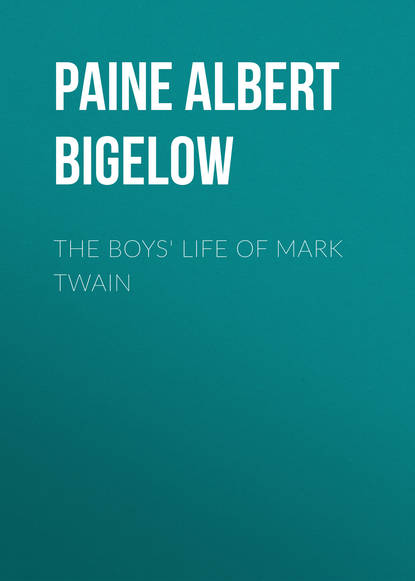 Полная версия
Полная версияThe Boys' Life of Mark Twain
But by Wednesday of the following week it was evident that the end was near. We did not know it then, but the mysterious messenger of his birth year, Halley's comet, became visible that night in the sky.13
On Thursday morning, the 21st, his mind was still fairly clear, and he read a little from one of the volumes on his bed. By Clara he sent word that he wished to see me, and when I came in he spoke of two unfinished manuscripts which he wished me to "throw away," as he briefly expressed it, for his words were few, now, and uncertain. I assured him that I would attend to the matter and he pressed my hand. It was his last word to me. During the afternoon, while Clara stood by him, he sank into a doze, and from it passed into a deeper slumber and did not heed us any more.
Through that peaceful spring afternoon the life-wave ebbed lower and lower. It was about half-past six, and the sun lay just on the horizon, when Dr. Quintard noticed that the breathing, which had gradually become more subdued, broke a little. There was no suggestion of any struggle. The noble head turned a little to one side, there was a fluttering sigh, and the breath that had been unceasing for seventy-four tumultuous years had stopped forever.
In the Brick Church, New York, Mark Twain—dressed in the white he loved so well—lay, with the nobility of death upon him, while a multitude of those who loved him passed by and looked at his face for the last time. Flowers in profusion were banked about him, but on the casket lay a single wreath which Dan Beard and his wife had woven from the laurel which grows on Stormfield hill. He was never more beautiful than as he lay there, and it was an impressive scene to see those thousands file by, regard him for a moment, gravely, thoughtfully, and pass on. All sorts were there, rich and poor; some crossed themselves, some saluted, some paused a little to take a closer look.
That night we went with him to Elmira, and next day he lay in those stately parlors that had seen his wedding-day, and where little Langdon and Susy had lain, and Mrs. Clemens, and then Jean, only a little while before.
The worn-out body had reached its journey's end; but his spirit had never grown old, and to-day, still young, it continues to cheer and comfort a tired world.
1
John Briggs died in 1907; earlier in the same year the writer of this memoir spent an afternoon with him and obtained from him most of the material for this chapter.
2
Horace Bixby lived until 1912 and remained at the wheel until within a short time of his death, in his eighty-seventh year. The writer of this memoir visited him in 1910 and took down from his dictation the dialogue that follows.
3
Depth of water. One-quarter less than three fathoms.
4
In the Mississippi book the author says that Brown was about to strike Henry with a lump of coal, but in the letter above mentioned the details are as here given.
5
In an earlier day, barrel hoops were made of small hickory trees, split and shaved. The hoop-pole was a very familiar article of commerce, and of household defense.
6
"My Debut as a Literary Person."
7
From "My Mark Twain," by W. D. Howells.
8
Chapter XXXIII.
9
Gillette was originally a Hartford boy. Mark Twain had recognized his ability, advanced him funds with which to complete his dramatic education, and Gillette's first engagement seems to have been with the Colonel Sellers company. Mark Twain often advanced money in the interest of education. A young sculptor he sent to Paris for two years' study. Among others, he paid the way of two colored students through college.
10
In Mark Twain—A Biography, by the same author.
11
At Mark Twain's death his various literary effects passed into the hands of his biographer and literary executor, the present writer.
12
His special favorites were Schubert's Op. 142, part 2, and Chopin's Op. 37, part 2.
13
See reference in Chapter lxvi.



